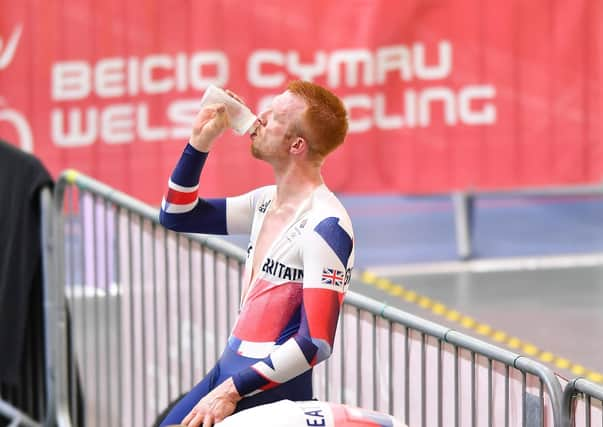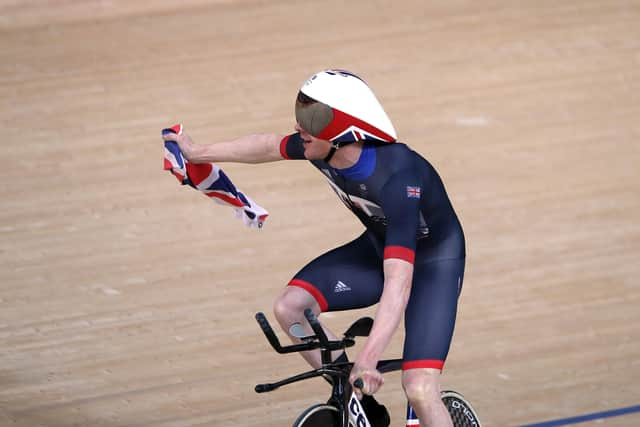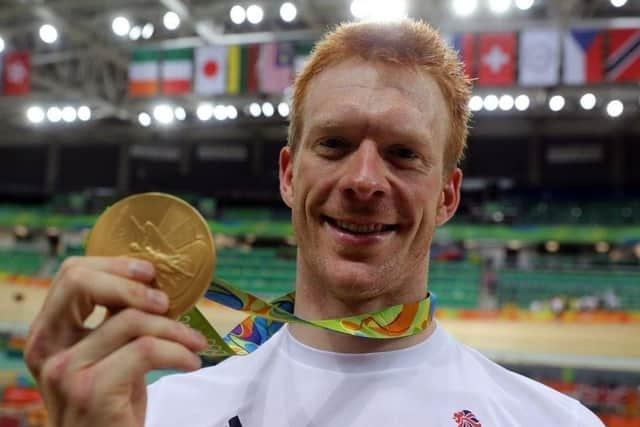Tokyo Olympics: Why it is not last of the summer wine time yet for Ed Clancy


He benefitted as much as anyone from Sir Dave Brailsford’s ‘marginal gains’ revolution that incorpated everything from nutrition to aerodynamics and transformed British Cycling.
He is still here now, at 36 years of age, three Olympic gold medals already in the locker but with the fire burning as brightly as ever.
Advertisement
Hide AdAdvertisement
Hide AdEd Clancy has seen it all in half a lifetime with the most successful track cycling team on the planet. Even as the Tokyo Olympics got underway this weekend, he could not quite bring himself to say this will be his last.


Paris is only three years away after all, and no-one loves riding his bike as much as the man from Holmfirth.
“I wouldn’t want to call it just yet,” he told The Yorkshire Post before flying out to the Far East for a shot at a fourth successive gold medal in track cycling’s team pursuit. That ambition – which even at this stage of his career is exactly what it is – is at the forefront of his thoughts.
Tuesday, August 3, is his singular goal, the heats of the team pursuit, with the final rounds following 24 hours later.
Advertisement
Hide AdAdvertisement
Hide AdIf he and his four-man team are to be riding for gold in the final race as they did in Beijing, London and Rio, they will have to come from further behind than they have ever done.


Clancy and the team pursuit squad have made a habit down the years of being overtaken in the down periods of the Olympic cycle only to peak when it mattered most at the Games.
But in the last world championships staged before the pandemic gripped the world and forced the abandonment of a host of competitions, Great Britain could only finish seventh, six seconds behind the new world champions from Denmark.
“There’s no doubt about it, this is going to be our biggest challenge,” says Clancy, who is more than a decade older than his three GB team-mates, Oliver Wood of Wakefield, Ethan Hayter and Ethan Vernon.
Advertisement
Hide AdAdvertisement
Hide Ad“We probably will step up from the world championships like we have done in the past, but whether we step up enough to get our nose in front like we have in the previous three Olympics, is going to be a bigger challenge than ever.
“We know that, we’re aware of it, it doesn’t change how we go about our business.
“I’d rather be open and honest about it, I just think it’s a sign of the times. I’ve got a lot of reasons to think given our recent performances in training that we’re going to put in a good performance. With myself and the youngsters we’re going to put together a ride that’s quicker than we’ve ever gone before but whether that’s going to be enough to see off the new strength in competition, is another question.”
The gap on the time sheet is stark. Denmark stopped the clock in Berlin in a new world record time of three minutes 46.579 seconds.
Advertisement
Hide AdAdvertisement
Hide AdGreat Britain’s time was 3:50.431. Eight years earlier in the London velodrome, Clancy and a team pursuit squad including Geraint Thomas won gold in a world record time of 3:52.499.
To that end, British Cycling have been a victim of their own success, something Clancy – who has lived through the evolution of the sport – is acutely aware of.
“Cycling 10, 15 years ago was quite traditional in terms of how people went about their training, the technical side of it, the strategy,” he says.
“Maybe it’s the same in other sports, but when I started back in Beijing, it was quite traditional. With Sir Dave at the reins he was happy to throw the rule book out the window, our coach for instance wasn’t a cycling coach, he was a physiologist, he understood the human body but didn’t know anything about cycling.
Advertisement
Hide AdAdvertisement
Hide Ad“Looking back, that was a big advantage and it gave us a head start on the rest of the world. We didn’t do things because that was the way they were done, we did things differently. Our training was revolutionary at the time and that put us a big way ahead of the competition. Ever since then other teams have taken notice and have been working away at the same things we have, and this is the result, a lot of teams are very switched on these days, they have a great set of riders that aren’t necessarily road riders, they train purposely for these events.”
For all his experience, Clancy does not walk around the velodrome in Manchester with his gold medals draped around his neck, telling the younger riders this is how it’s done.
“I do have a bit more of a voice these days than I did have and you kind of use your experience more around difficult conversations and trying to orchestrate things a little bit,” he offers. “But the truth is I can’t say ‘this is how I won my three gold medals in the past, let’s just do what I did’ because that doesn’t work either. It’s new territory for all of us. I don’t have the answers. I can’t say this is how we’re going to go five seconds faster because if I knew that I’d have done it before.
“It’s a case of collectively working together, listening to all opinions, the riders, the staff, and build a synergy between us.”
Advertisement
Hide AdAdvertisement
Hide AdThat he is still here, hungry for Olympic titles, is down to his sheer enjoyment of riding a bike.
There were times though, he admits, in the dark days of the pandemic, when he wondered if the end had arrived.
“I absolutely considered retirement,” says Clancy.
“The British Cycling team had a big discussion last year when we knew the Olympics were going to be cancelled. You can imagine for a lot of the youngsters there was never a question they wouldn’t be continuing, because even if Tokyo didn’t go ahead, they were all in for Paris.
“For me there were different questions. I took my time and told them I wanted to go away and think about it and to be fair they gave me that time and space. I spoke to friends and family, team-mates, former team-mates that have now retired, and got an idea of what life might have been like on the other side.
Advertisement
Hide AdAdvertisement
Hide Ad“And ultimately I chose to do what I wanted to do and I really wanted to see it out, so I’m still here. To have had your hand forced by the pandemic would’ve been understandable because everyone’s goalposts have been moved whether they liked it or not, but I’m genuinely really chuffed that the Tokyo Olympics is going ahead and I’m going to have the chance to get on that bike and pedal again.”
Watching Mark Cavendish winning stages on the Tour de France again these past few weeks, 13 years since the Manxman was first doing it, helped bring home to Clancy the longevity of his own career.
“I have been fortunate to grow up in that British Cycling system,” says Clancy, who adds that dividing his team between riding on the track and for UK-based road teams helped keep him fresh.
“I went into an amazing Olympic programme that in 2008 and 2012 - who wouldn’t have wanted to be part of that? I just loved it.
Advertisement
Hide AdAdvertisement
Hide Ad“For everything that has been said about British Cycling I still think it’s a great place to be. I really enjoy it there and I guess that’s what keeps me going back.
“Ultimately you keep going back to it because you love it.”
So what of the future? How long can a love of cycling keep him at the top his sport?
He has already set up the Clancy Briggs Academy with Doncaster road racer Graham Briggs to try and get young people onto their bikes, and growing that throughout the country is his next big challenge.
He plans to race in the new Track Champions League at the end of the year, a new format designed to attract a new audience.
Advertisement
Hide AdAdvertisement
Hide AdBut Yorkshire’s most decorated Olympian does concede: “I think it’s possible it’s going to be my last team pursuit.
“In terms of my Olympic career and my future with the British Cycling team I need to have a think about it after Tokyo.
“I’m still really enjoying it, I’m well aware I’m not getting any younger. I’m still making the team on merit, they’re not giving me a GB jersey because people like me in the building.
“We’re still there with a chance of getting an Olympic medal, so if I’m still enjoying it I wouldn’t want to say that would be that just yet.
“See how Tokyo goes and see how I feel on the other side of it. I’m not going to make any hard and fast decisions just yet, but I am mulling it over.”
Comment Guidelines
National World encourages reader discussion on our stories. User feedback, insights and back-and-forth exchanges add a rich layer of context to reporting. Please review our Community Guidelines before commenting.